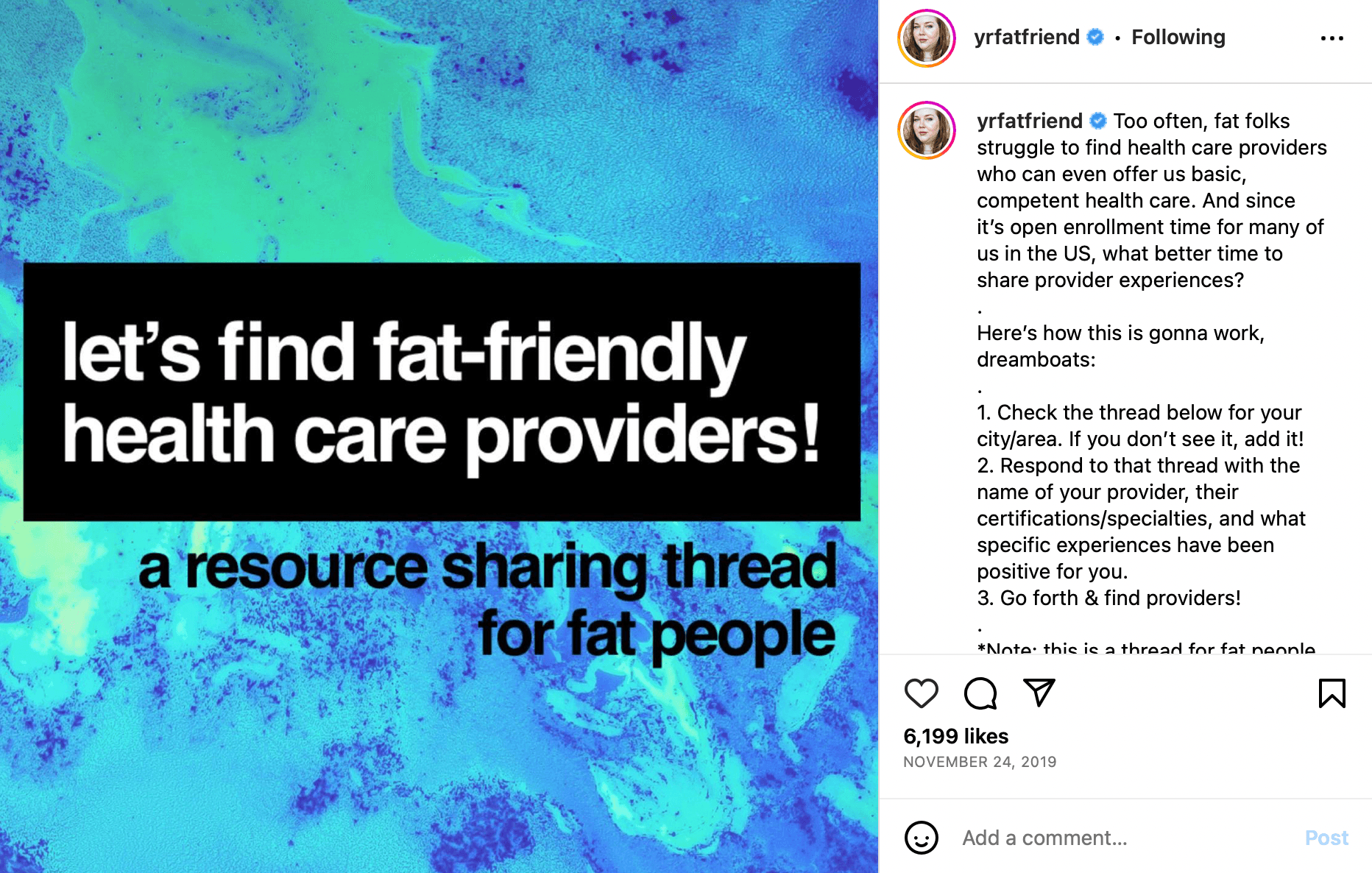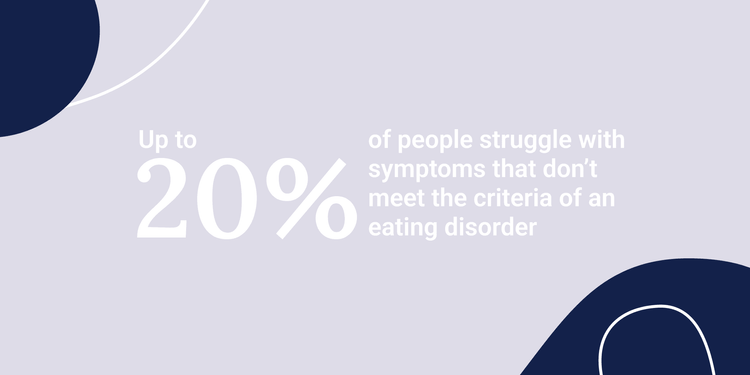
Aubrey Gordon is a self-described "very fat person."
As an activist, podcaster, and author, Gordon doesn't shy away from discussing the blame, discrimination, and mistreatment she faces because of her weight. It is everywhere, including the doctor's office.
"I had good insurance and plenty of doctors nearby. I had all the access I needed. But there was just one problem: I was fat, and I couldn't seem to find a doctor who would take my symptoms seriously. So, for the better part of a decade, I abandoned the medical care that had long since abandoned me," she wrote in her Self magazine column in 2018.
According to Gordon, also the subject of a documentary premiering this June, "Every symptom, from ear infections to endocrine issues, was attributed to my size and met with a requirement of weight loss. It was a strange feeling: to be so readily disregarded, so lazily misled, and still to feel so ashamed."
Shame. Just one of the insidious effects of weight stigma. Decades of research have revealed the negative consequences of weight stigma for people with higher weight or obesity, including emotional and psychological distress, disordered eating, and poorer mental health.
In the hands of doctors and other healthcare providers, weight stigma can be a matter of life and death. In fact, a longitudinal study from the United States associated weight discrimination and increased risk of death after adjusting for other factors.
Just how widespread is the problem? How does it play out? What can people with higher weight or obesity do about it? And how can they find healthcare providers who will treat them with compassion, respect, and the best evidence-based care?
Weight stigma in healthcare
What Gordon experienced at the hands of healthcare providers — and her choice to avoid visits and defer preventative care — is perilously common.
When psychologists at the Rudd Center for Food Policy & Obesity at the University of Connecticut surveyed American adults enroled in Weight Watchers, they found that as many as 40% of American adults experience weight-based teasing, unfair treatment, and discrimination, particularly people with high body-mass index, with obesity, and women. Next to family members and classmates, doctors are the most common interpersonal source of weight stigma.
A follow-up study by the same researchers with the same participants found that 63-74% of participants felt fat-shamed by doctors because of their weight. As a result, they said they were less likely to seek healthcare.
Another study reported that women with a higher body mass index were likelier to report negative care experiences during pregnancy and after birth than women with a lower weight.
What weight-based stigma in healthcare looks like
There are thousands of personal anecdotes from people with higher weight or obesity on social media who are fed up with bias in healthcare that can jeopardize diagnosis, treatment, and optimal health. For example, women with obesity say they have had serious health concerns dismissed or overlooked. Some recount doctors who recoil at conducting a physical exam, or attribute every symptom to excess weight, failing to consider other causes and, ultimately, misdiagnosing the problem.
Here are some ways weight stigma in healthcare settings plays out:
Assumptions about lifestyle: Healthcare providers may assume that women with obesity are not physically active or have poor eating habits without considering other factors that strongly influence body weight, such as genetics, hormonal imbalances, or medication side effects.
Dismissal of health concerns: Healthcare providers may be dismissive, attributing health concerns to their weight rather than investigating other possible causes. They may also spend less time in consultations.
Stigmatizing language: Healthcare providers may use stigmatizing language, such as describing a patient as "obese" or "morbidly obese," which can dehumanize and contribute to feelings of shame and low self-esteem.
Lack of accommodation: Clinics may not have adequate equipment, such as blood pressure cuffs or seating, to accommodate women with high weight, making them feel excluded and uncomfortable.
Inappropriate comments, behaviors, or facial expressions: Healthcare providers may make inappropriate comments or engage in discriminatory behaviors, such as providing unsolicited weight loss advice, unwillingness to perform specific exams, or making less eye contact.
How to fight back against weight stigma and discrimination
Increasingly, medical schools and healthcare organizations such as the American Medical Association are committing to ending weight bias and stigma through education, training, and the use of people-first language that emphasizes a patient's health and well-being without making assumptions or negative judgments about their weight or size.
While new policies and guidelines are much needed, they are slow to trickle down to patients. So, what can individuals do to advocate for themselves and find providers who will treat them with fairness, dignity, and respect?
Speak up: If you experience weight-based microaggressions or discrimination, don't be afraid to speak up and share your concerns with the healthcare provider or their staff. They may be unaware of the impact of their language or behaviors. Speaking up is difficult, but you can calmly and respectfully let them know how they made you feel and ask for more respectful and compassionate treatment.
Seek support: Seek support from others who have experienced weight-based microaggressions, stigma, or discrimination. This can include support groups such as the Obesity Action Coalition's Regional Community Network, online forums, or advocacy organizations that provide resources and support for individuals who have experienced weight-based discrimination.
Take care of yourself: Take care of yourself by prioritizing your physical and mental health. This can include seeking out healthcare providers who provide non-stigmatizing care, engaging in activities that you enjoy, prioritizing sleep, and seeking support for mental health concerns, if needed.
Advocate for change: Advocate for change by speaking out about weight bias and stigma and pushing for policy change and education that can help to address these issues. You can write to your local legislators, share your story with the media, or join advocacy organizations working to reduce weight bias and stigma.
How to find size-friendly healthcare
It is possible to find non-stigmatizing care. For example, Gordon started a thread on Instagram where "fat people" could share their resources and experiences with healthcare providers. It is meant to help people find size-friendly healthcare or avoid stigmatizing care.
A similar "megathread" on Reddit offers additional recommendations.
In addition to these crowd-sourced resources, organizations like the Association for Size Diversity and Health (ASDH) and Obesity Canada are educating healthcare providers on obesity and inclusive healthcare. For example, ASDH developed the Health at Every Size® Principles to guide healthcare providers and improve the quality of care. In addition, it offers a directory of healthcare professionals who follow the principles.
Fat-friendly Healthcare Providers by U.S. states, including doctors, nurse practitioners, mental health professionals, and other healthcare providers. Similar directories are maintained by other groups. For example:
- The Obesity Action Coalition has a directory of healthcare providers who have pledged to provide non-stigmatizing care to individuals with obesity. The list includes primary care physicians, specialists, surgeons, dietitians, midwives, massage therapists, fitness professionals, and health and wellness providers.
- Plus Size Birth offers a Size-Friendly Directory of doulas, midwives, and OBGYNs
- Weight Inclusive Nutrition and Dietetics
- Inclusive Therapists lists body-positive therapists
Subscribe to our newsletter
Get a weekly roundup of articles, inspiration, and brain health science in your inbox. Subscribe now.



